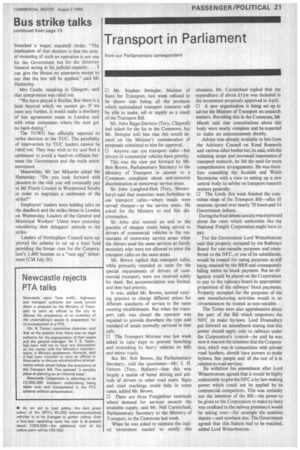Transport in Parliament
Page 23

If you've noticed an error in this article please click here to report it so we can fix it.
from our Parliamentary correspondent El Mr. Stephen Swingler, Minister of State for Transport, last week refused to be drawn into listing all the products which nationalized transport concerns will be able to make, sell or supply as a result of the Transport Bill.
Mr. John Biggs-Davison (Tory, Chigwell) had asked for the list in the Commons, but Mr. Swingler told him that this would depend on the Minister's consideration of proposals submitted to him for approval.
D Anyone can use transport cafes—but drivers of commercial vehicles have priority.
This was the view put forward by Mr. Bob Brown, Parliamentary Secretary to the Ministry of Transport in answer to a Commons complaint about anti-motorist discrimination at motorway service areas.
Sir John Langford-Holt (Tory, Shrewsbury) said that motorists were forbidden to use transport cafes—where meals were served cheaper—at the service areas. He asked for the Ministry to end this discrimination.
Sir John also wanted an end to the practice of cheaper meals being served to drivers of commercial vehicles in the restaurants of motorway service areas when the drivers used the same services as family motorists who were not allowed to enter the transport cafes on the same areas.
Mr. Brown replied that transport cafes, while primarily intended to cater for the special requirements of drivers of commercial transport, were not reserved solely for theni. But accommodation was limited, and they had priority.
It was, added Mr. Brown, normal catering practice to charge different prices for different standards of service in the same catering establishment. But when the transport cafe was closed the operator was required to provide elsewhere the type and standard of meals normally serviced in that cafe_ CI The Transport Minister was last week asked to take steps to prevent bunching and overtaking by heavy vehicles on hills and minor roads.
But Mr. Bob Brown, the Parliamentary Secretary, told the questioner—Mr. J. H. Osborn (Tory, Hallam)—that this was largely a matter of better driving and attitude of drivers to other road users. Signs and road markings could help in some cases, added Mr. Brown.
0 There are three Freightliner terminals where demand for services exceeds the available supply, said Mr. Neil Carmichael, Parliamentary Secretary to the Ministry of Transport, in the Commons last week.
When he was asked to estimate the capital investment needed to rectify this situation, Mr. Carmichael replied that the expenditure of about £ was included in the investment proposals approved in April. 0 A new organization is being set up to advise the Minister of Transport on research matters. Revealing this in the Commons, Mr Marsh said that consultations about this body were nearly complete and he expected to make an announcement shortly.
Advice was already available to him from the Advisory Council on Road Research and various other bodies but, he said, with the widening scope and increased importance of transport research, he felt the need for more comprehensive arrangements. He was therefore consulting the Scottish and Welsh Secretaries with a view to setting up a new central body to advise on transport research matters generally.
9 The Lords this week finished the committee stage of the Transport Bill—after 10 sessions, spread over nearly 70 hoursand 14 Government defeats.
During the final debate anxiety was expressed about the rates which authorities like the National Freight Corporation might have to pay.
For the Government Lord Winterbottom said that property occupied by the Railways Board for non-rateable purposes and trans ferred to the NFC, or one of its subsidiaries, would be treated for rating purposes as still being retained by the BRB and consequently falling within its block payment_ But an obligation would be placed on the Corporation to pay to the railways board its appropriate proportion of the railways' block payments. Property occupied for the purposes of the new manufacturing activities would in no circumstances be treated as non-rateable.
The Tories were also apprehensive about the part of the Bill which empowers the NFC to make by-laws. Lord Drumalbyn put forward an amendment stating that this power should apply only to railways under the Corporation's control—he said he was sure it was not the intention that the Corporation, which was in competition with private road hauliers, should have powers to make bylaws, fine people and all the rest of it in relation to road services.
He withdrew his amendment after Lord Winterbottom agreed that it would be highly undesirable to give the NFC a by-law-making power which could not be applied by its commercial competitors. This was certainly not the intention of the Bill—the power to he given to the Corporation to make by-laws was confined to the railway premises it would be taking over—for example the sundries depots—and nowhere else. The Government agreed that this feature had to be watched, added Lord Winterbottom.




































































































